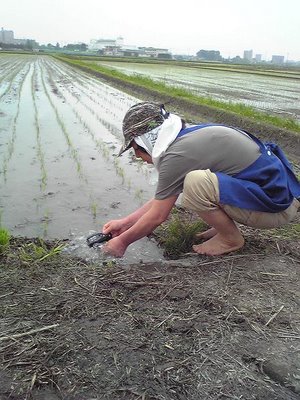Cheap rice hurts Kan’s free trade push

Asahi Shimbun 2010/10/15
Cheap rice hurts Kan’s free trade push
Prime Minister Naoto Kan’s hopes of joining efforts to create an Asia-Pacific free trade zone has put his administration on a collision course with farmers battling depressed rice prices.
Kan is keen on having Japan take part in negotiations for a Trans-Pacific Partnership (TPP) agreement, and as host for the Asia-Pacific Economic Cooperation (APEC) leaders meeting in November, he has been feverishly pitching the idea in recent weeks.
The TPP calls for a multilateral economic partnership deal that would eliminate all tariffs on trade, including agricultural produce, and free investment in the Pacific region.
The idea was first pitched by Singapore, New Zealand, Brunei and Chile in 2006, and the United States, Australia, Peru and Vietnam are now in negotiations on joining the arrangement. Canada and Malaysia have also expressed interest in joining.
The Democratic Party of Japan-led government views the TPP as a vital step to stop Japanese industry from slipping behind its international competitors.
But sagging rice prices, largely a result of surplus supply, have caused concern among agricultural communities that liberalization could further damage farmers’ livelihoods.
Responding to a question on how he intended to balance the need to liberalize trade while protecting domestic farming, Kan told a Lower House Budget Committee meeting Wednesday: "Regarding agriculture, I have no plans to shirk responsibility, including affairs involving regional policy. I believe that debate must be carried out with a view toward the future of Japan."
Referring to the TPP in his policy platform at the opening of the current extraordinary Diet session on Oct. 1, Kan said he would direct discussions on forming an Asia-Pacific free trade zone.
Indeed, so seriously does Kan see the issue of liberalizing trade that, soon after his re-election in mid-September, he likened it to "the third kaikoku (opening of Japan to the world), following the Meiji Restoration (of 1868) and defeat in World War II."
He instructed Koichiro Genba, state minister in charge of national policy, to begin preparations and a study group was soon formed with Tatsuo Hirano, senior vice minister in the Cabinet Office, among the members.
Kan’s commitment to the policy appears to be partly inspired by a fear that Japan could "miss the bus" as neighboring nations sign up to free trade deals. A recent reminder of that risk was the signing of a free trade agreement between South Korea and the European Union.
On Oct. 8, Kan instructed involved ministers to draw up a basic policy on forming comprehensive economic partnerships before the Yokohama APEC summit.
Another factor is Washington. President Barack Obama announced in November 2009 that the United States would join the TPP, and many expect Washington to try to wrap up a deal when it hosts the APEC summit next year.
A senior policy aide to Kan said Washington "surely expects Japan to participate as well." In light of the souring of relations over the U.S. base relocation issue, some are arguing that joining the TPP would be a way to mollify the United States.
However, there is opposition even within the DPJ to the TPP plan.
"Income and employment for the nation’s farming and fishing communities will be lost, and it (TPP) would mean the destruction of not only the regional economy, but the community itself," said Akira Gunji, a DPJ Upper House member and former senior vice farm minister.
An individual income support program to compensate farm households when market prices for produce fall below production costs was introduced this fiscal year and is meant to allay farmers’ concerns.
But there is strong skepticism about the program’s capacity to respond to the effects of cheap grain imports. Some have already suggested that the program may actually be partly responsible for recent falls in rice prices.
A newly harvested 60-kilogram bale of Sasanishiki brand rice produced in Miyagi Prefecture was priced at 12,000 yen ($147) in September, about 3,000 yen cheaper than last year.
Farmers have complained that current prices do not even allow them to repay loans for buying farm equipment. There is concern that the government, already mired in debt, will not be able to cover the losses in farming communities.
The government has so far earmarked only 561.8 billion yen for the income support program, only enough to cover losses if rice prices fall to around 13,000 yen a 60-kilogram bale. As prices for many brands have already plummeted to the 12,000- to 13,000-yen range, farmers are worried that the budget will quickly dry up.
But if the government moves to fix prices, the logic of the income support program would be undermined and consumers would be forced to shoulder the burden.
In exchange for its FTA with the EU, South Korea decided to inject the equivalent of 9 trillion yen to help protect its farming sector through 2017.





